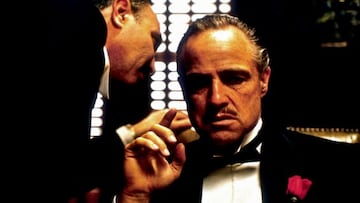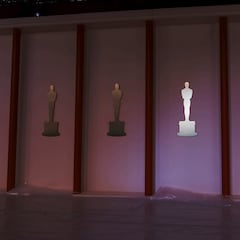Who has turned down an Oscars award?
There have been three people in the history of the Academy Awards to refuse the trophy.

For most people, winning an Academy Award is a career goal, and they spend years of their careers working towards it. For others, that isn’t the case.
While Katherine Hepburn famously declined every invitation to attend the Academy Awards, she reportedly displayed the Oscars trophies she had won proudly in her home. However, Marlon Brando, George C. Scott, Dudley Nichols flat out refused the award.
Out of more than 2000 Academy Awards winners, there have been three nominees who declined the award — though one winner accepted it some years later.
1935 Oscar for Best Screenplay
The first-ever Academy award refusal happened in 1932. Screenwriter Dudley Nichols rejected the golden statue after winning the award for Best Screenplay.
Nichols refused to accept the award because there was an ongoing writer’s strike in the industry. However, the screenwriter later accepted the award in 1938 once the writer’s dispute was over.
Nichols was then elected President of the Writers Guild Of America.
His winning film, ‘The Informer’, is a movie set during the Irish War of Independence and is based on Liam O’Flaherty’s novel of the same title.
The film was well-recognized that year, with John Ford winning the award for Best Director as well.
1971 Oscar for Best Actor
George C. Scott always had a reputation for his dislike of the whole event, as he rejected two nominations in his career and spoke openly about his distaste for the ceremony.
When he was nominated for Best Actor in 1971 for his leading role in ‘General George S. Patton’, Scott refused the nomination. He had previously done the same thing in 1962, when he was nominated for an Oscar in the Best Supporting category. When nominated a second time, he again refused the nomination.
“[It’s] a two-hour meat parade, a public display with contrived suspense for economic reasons,” Scott wrote in a telegram to the Academy in his formal refusal of the award, telling them he didn’t even want his name on the ballot.
“I respectfully request that you withdraw my name from the list of nominees. My request is in no way intended to denigrate my colleagues.”
Despite his best efforts, Scot did win the 1971 Academy Award for Best Actor. The film’s producer, Frank McCarthy, accepted the award on Scott’s behalf. Scott returned it to the Academy the next day.
1973 Oscar for Best Actor
Marlon Brando was the favorite to win the Best Actor award for his role in the legendary film, ‘The Godfather’, yet he sent someone else in his place to the 1973 ceremony.
Brando won the award and sent Sacheen Littlefeather, apache and president of the National Native American Affirmative Image Committee, to represent him with a 15-page letter about a protest.
‘The Godfather’ actor was part of the American Indian Movement during that time, and refused the award to draw attention to the “Wounded Knee Incident”, a small town occupied for 71 days by about 200 Oglala Lakota and AIM activists.
Related stories
“He very regretfully cannot accept this very generous award and the reasons for this being are the treatment of American Indians today by the film industry and on television, in movie reruns and also with recent happenings at Wounded Knee,” Littlefeather said.
“I beg at this time that I have not intruded upon this evening and that we will in the future, our hearts and our understandings will meet with love and generosity thank you on behalf of Marlon Brando.”




